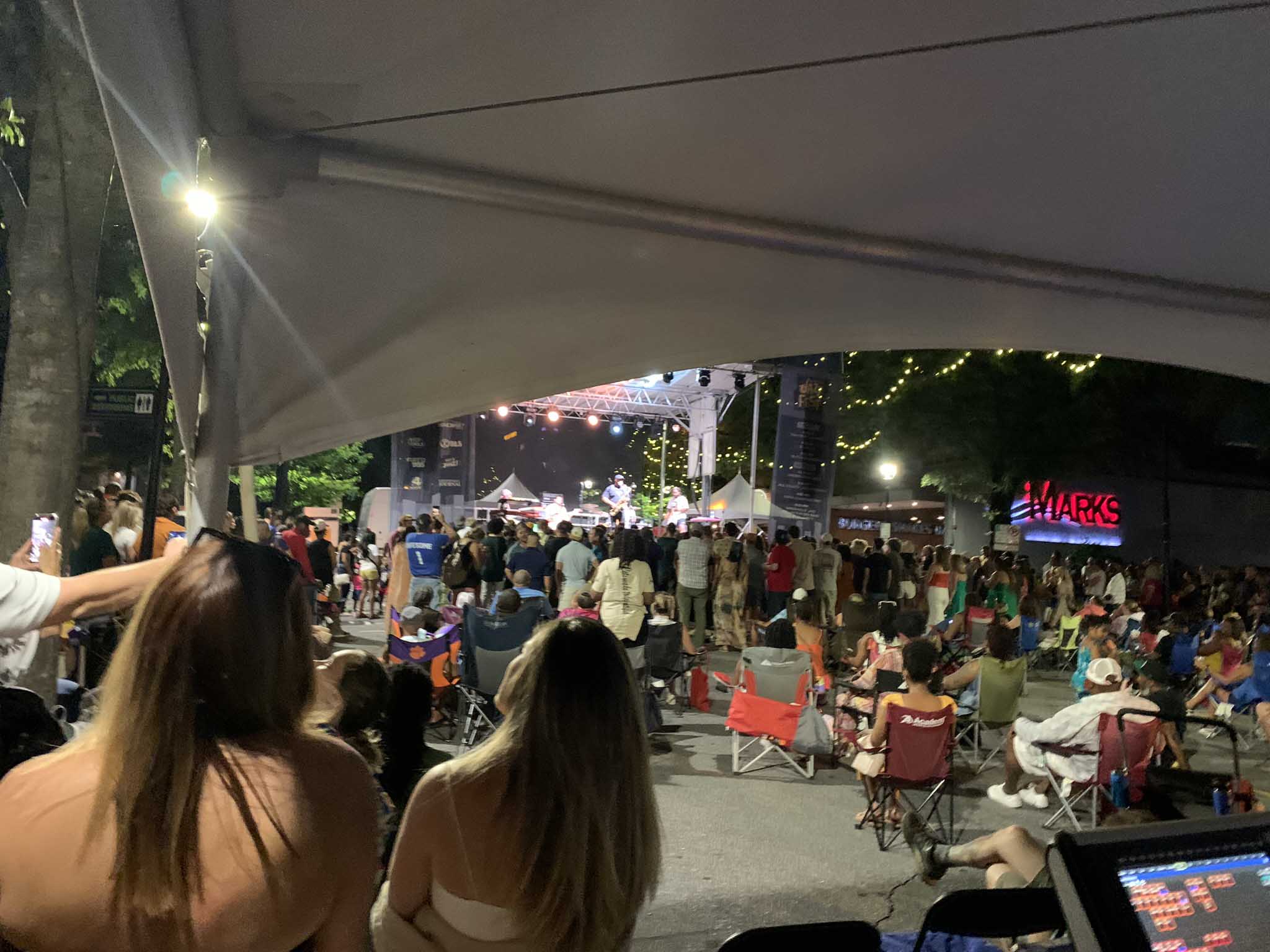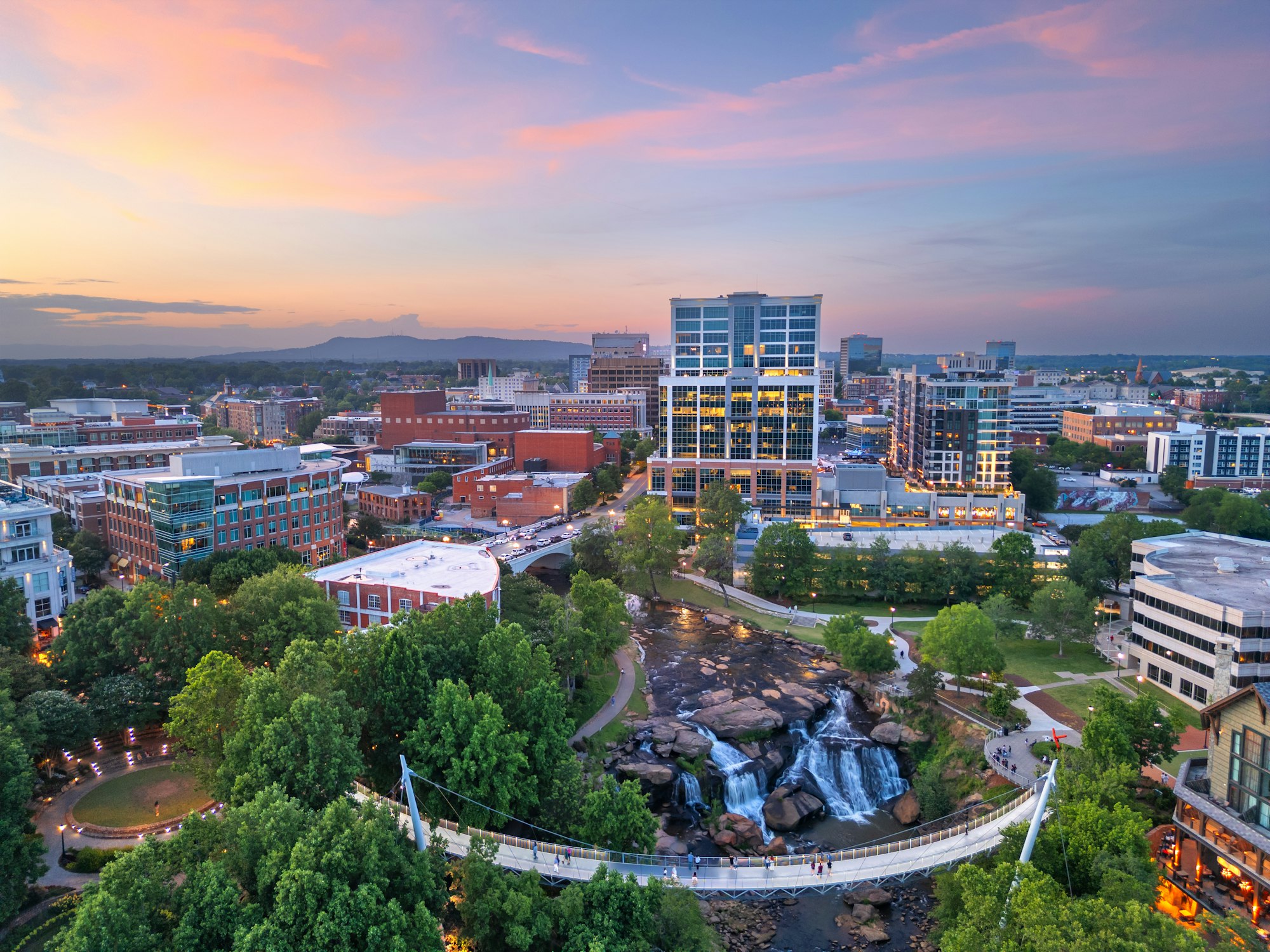One of the most attractive things about Greenville – and one reason it’s growing so fast – is that it’s pretty affordable compared to many parts of the country. You can enjoy a great lifestyle here without breaking the bank. Let’s talk numbers and specifics: housing, rent, taxes, etc.
-
Overall Cost of Living: As of 2025, the cost of living in Greenville is estimated to be around 7% lower than the U.S. averagerentcafe.com. In other words, your dollar stretches a bit further here than it would in, say, the Northeast or West Coast. When comparing to the state of South Carolina overall, Greenville is just slightly (about 2%) above the state averagerentcafe.com. So it’s one of the more affluent areas in SC, but still cheaper than the national norm.
Breaking it down: Housing is the big factor – it’s significantly cheaper here than in many U.S. cities. In fact, Greenville’s housing costs are roughly 25–27% lower than the national averagerentcafe.comrentcafe.com. That is a huge advantage, especially for folks relocating from expensive markets. Other expenses like groceries and utilities are pretty close to average (a tad lower or higher by a couple percentrentcafe.com), and healthcare costs here are about on par or slightly higher (SC has some higher healthcare costs)rentcafe.com. But generally, nothing in Greenville is exorbitantly priced relative to incomes.
-
Home Prices: The median home prices in the Greenville area have risen due to demand, but they remain moderate. As of early 2025, the median price for a single-family home in Greenville is in the ballpark of $330,000–$360,000apartmentlist.com depending on which report you look at. One source put it around $358,800apartmentlist.com, another around $336,700rentcafe.com – likely the difference of city vs. broader metro. To give context: Charleston, SC’s median is near $500k, and national median house price is over $400k, so Greenville’s quite reasonable. Of course, home prices vary by location and property. You can still find townhomes or older homes in the low $200s in some areas, or spend $500k+ on a new large suburban house or a fancy downtown condo. But for a typical middle-class family, Greenville’s housing market offers a lot of value for the money. Many people move here specifically because they realize “Hey, I can afford a bigger or nicer home in Greenville than in the city I’m coming from.”
It’s worth noting that home values have been on an upward trend (Greenville is popular!), but the pace is steady and not bubble-crazy. Also, property here tends to come with a bit of land – it’s common to have a decent yard, which transplants from dense cities really appreciate.
-
Rent: If you’re looking to rent, Greenville has plenty of apartments and houses for rent. The average apartment rent in Greenville is around $1,500–$1,600 per month for a typical unitrentcafe.com. For example, a one-bedroom apartment might average ~$1,300, and a two-bedroom around $1,500–$1,700 depending on locationrent.com. New luxury apartments downtown or in hot neighborhoods will be on the higher side (think $1,800+ for a 2-bedroom in a brand-new downtown complex with amenities). But you can also find more affordable rents in older complexes or further out – plenty of options under $1,200 if you don’t need to be right downtown. Overall, rent is significantly less than big metro areas; it’s one reason young professionals find Greenville attractive. You might pay half the rent here for a similar apartment compared to, say, Boston or San Francisco.
A recent average cited was $1,578/month for an apartment in Greenvillerentcafe.com, which aligns with those figures. Single-family homes for rent vary widely, but something like a 3-bed, 2-bath house might rent for $1,800-$2,200 in a nice suburb, more if it’s a large or very new house.
-
Taxes: Let’s break down taxes – because this is an area where South Carolina (and Greenville) can save you money:
-
Property Taxes: South Carolina has very low property taxes compared to most states. The effective property tax rate here is around 0.5% of a home’s valuewallethub.com, which places SC among the top 5 lowest property tax states in the U.S.wallethub.com. For owner-occupied homes, it can be even lower due to exemptions (SC gives a nice break to primary residences – they’re assessed at 4% value vs 6% for second homes or commercial property, and there’s a homestead exemption for seniors/veterans/etc.). In practical terms, if you buy a $300,000 house and live in it as your primary home, your annual property tax might be on the order of $1,500 – $2,000. Many newcomers find this astonishingly low, especially if they come from places like the Northeast where that could be $6k-$8k in taxes. Low property tax is a big draw for retirees too.
-
Income Taxes: South Carolina has a state income tax that ranges from 0% up to 6.5% (recently lowered; it used to be 7% top bracket). Most middle-income folks will pay somewhere around 5-6% state income tax on taxable income. There are standard deductions and so forth. The state has been gradually cutting the top rate, with a goal to bring it to 6% in a few years. So, income tax in SC is moderate – not the lowest (we’re no Texas or Florida with zero state tax), but also not as high as some other states with 9-10% rates. For many people moving from high-tax states, SC’s income tax feels like a relief. For others coming from no-tax states, well, you might pay a little here, but you’ll save it in other areas (like those low property taxes, or generally lower cost goods).
-
Sales Tax: The state sales tax is 6%. Greenville County adds a 1% local option sales tax, making it 7% sales tax on most purchases in the area. This is pretty standard; many SC counties are 7% or even 8%. Groceries (unprepared food) are exempt from the state portion, so effectively grocery food is taxed at just 1% here (just the local penny tax). Dining out and retail items will be 7%. One thing: South Carolina does have an extra tax on accommodations and hospitality – visitors might notice an extra 2% tax on hotel rooms and prepared meals, which goes toward tourism funding. But for day-to-day living, 7% is the general sales tax you’ll see on receipts.
-
Other taxes/fees: Car taxes – SC charges property tax on vehicles each year (when you renew registration). It’s based on vehicle value and the millage rate, but to illustrate: on a ~$25,000 car, you might pay a couple hundred dollars annually in car tax. It decreases as the car depreciates. There’s also a one-time $250 registration infrastructure fee when you bring an out-of-state vehicle into SC (essentially a cap instead of a steep car sales tax). Gas taxes here are lower than many states (recently raised to ~$0.28/gal, but still lower than national avg, which keeps gas prices moderate). South Carolina doesn’t tax Social Security income and offers other retirement income deductions, which is a perk for retirees.
Overall, taxes in Greenville/SC are considered very taxpayer-friendly. Many rankings put SC in the lower third for overall tax burden. As a result, the state and local governments keep budgets tight – but Greenville has managed to invest in amenities through other means (like that local hospitality tax for downtown improvements). For residents, it means you get to keep more of your paycheck and your home won’t be taxed heavily year after year.
-
-
Utilities and Other Costs: Utilities (electric, gas, water) in Greenville are around or slightly below U.S. averages. For example, electricity might run $120/month on average, water/sewer maybe $30-40, natural gas $50 (varies by season). Internet service is available through several providers and is competitively priced – lots of folks pay $50-70/month for high-speed internet. One nice thing: South Carolina’s mild winters mean heating costs aren’t too bad, though the hot summers can bump up your AC bill a bit. Still, overall utility costs here are about 7% lower than national averagerentcafe.com.
One cost that might be higher is car insurance – SC’s car insurance rates are slightly above national average due to accident rates, but it’s not outrageous. Healthcare as mentioned can be a tad higher – we have excellent healthcare systems (Prisma Health, Bon Secours) and many retirees, which influences costs. But many people find healthcare here still cheaper than in big metro areas.
-
Groceries and Goods: Groceries in Greenville are roughly 2% cheaper than U.S. average on aggregaterentcafe.com, which is negligible – essentially, food costs here track national trends. We have a variety of grocery options, from budget stores like Aldi and Walmart to higher-end like Publix or Whole Foods. Dining out, you’ll generally find better prices than major cities – you can get a great meal without straining your wallet (though of course there are upscale spots too). Entertainment is reasonably priced: movie tickets ~$10-12, minor league baseball game maybe $10, etc. Many of the city’s attractions (Falls Park, festivals, museums on certain days) are free or low-cost.
In summary, Greenville offers a high quality of life at a lower cost. This is a huge part of its appeal. You can potentially afford a house and have money left to enjoy dining, travel, and hobbies – which is something people relocating from pricey cities really appreciate. Even for locals, while the cost of living has crept up a bit with the city’s popularity, it remains very manageable. A family or individual can live comfortably here without the financial stress that often comes in larger metros.
A quick scenario to illustrate: Let’s say a couple is considering retirement. They find that in Greenville, they can buy a beautiful home for half of what it would cost in the Northeast, pay a fraction in property tax, enjoy lower day-to-day expenses, and still get excellent amenities and healthcare. It’s an easy choice. Similarly, a young grad considering job offers might realize the salary in Greenville, even if slightly lower, goes further in actual living than a higher salary in NYC or DC.
Of course, everyone’s situation varies, but by and large, Greenville’s cost of living is friendly to your wallet. It’s part of why people here seem to have a good work-life balance – the economic pressure is just a bit less, giving you more breathing room to enjoy life in our lovely town.




